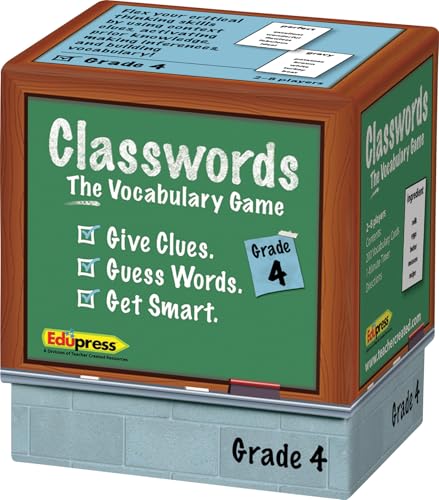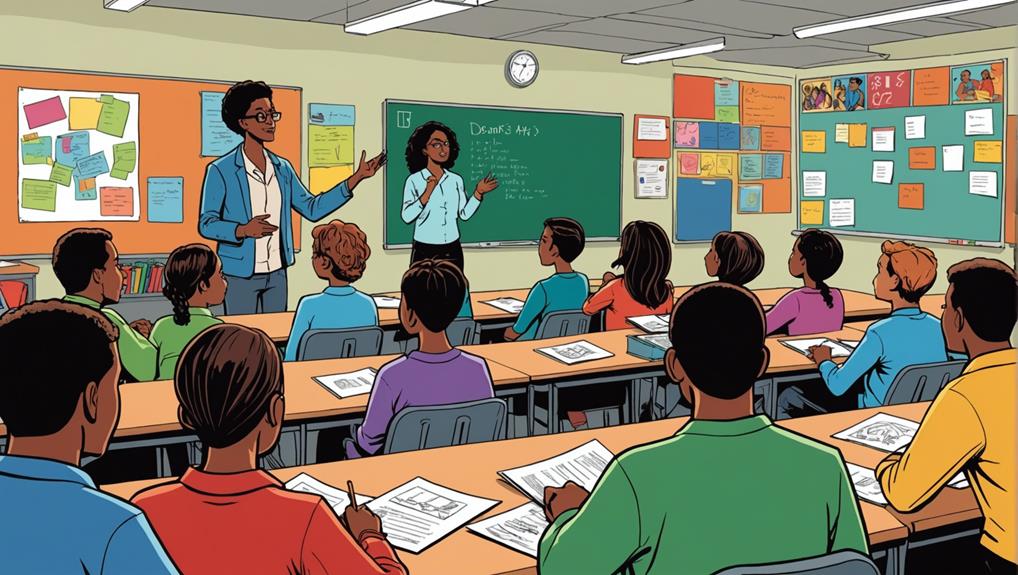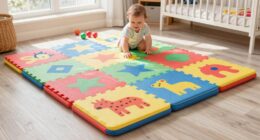Seeking to engage students with interactive learning games? Search no more! These games are not just fun but also enhance language skills, foster creativity, and promote critical thinking. From exciting vocabulary challenges to competitive content activities, there's something for everyone. They create a dynamic classroom environment where students actively participate, communicate effectively, and retain knowledge better. By sparking excitement, promoting teamwork, and challenging higher-order thinking, these games make learning a thrilling adventure. So, why not give them a try and discover how interactive games can transform your educational experience?
Key Takeaways
- Implement vocabulary games to enhance language skills and retention.
- Use interactive descriptive challenges to foster critical thinking and communication.
- Introduce competitive content learning activities to promote teamwork and quick decision-making.
- Engage students with guessing games to spark creativity and critical thinking skills.
- Utilize adaptable educational game formats for versatile engagement across subjects.

BenBen Spelling Games, 224 Flashcards, 208 Wood Letter Tiles, 1-4 Players, Learning Games for Kids 4-8, Educational Toys for Kindergarten 1st 2nd Grade, Preschool Classroom Must Haves
【SPELLING TOY CONTENTS】224 double-sided phonic flash cards + 208 wood letter tiles (8 complete A–Z sets) + 2…
As an affiliate, we earn on qualifying purchases.
As an affiliate, we earn on qualifying purchases.
Exciting Vocabulary Games

Engaging vocabulary games offer a dynamic way to enhance language skills and retention among students. By incorporating interactive elements into learning, students not only expand their vocabulary but also improve their ability to recall and apply new words effectively.
Games like Splat and Mystery Word encourage active participation and communication, making the learning process both enjoyable and educational. These games are particularly beneficial for English as an Additional Language (E.A.L.) learners as they provide a fun and engaging way to practice and consolidate key vocabulary.
With a variety of vocabulary games available, teachers can create a stimulating classroom environment that fosters language development and student engagement.

Edupress Classwords Vocabulary Game, Grade 4 (EP-3752)
Sold as 201 pieces/Set.
As an affiliate, we earn on qualifying purchases.
As an affiliate, we earn on qualifying purchases.
Interactive Descriptive Challenges

Integrating interactive descriptive challenges into educational settings can enhance student participation and deepen comprehension of content. These activities prompt students to think creatively, communicate effectively, and engage actively with the material.
Mystery Word, for instance, encourages students to describe a chosen word without actually saying it, fostering communication skills and critical thinking. The Human Graph involves posing questions that students physically answer by forming human graphs, making learning interactive and dynamic.
Meanwhile, True or False Walls challenges students to move to designated areas based on questions, promoting engagement and participation. These interactive games not only make learning fun and exciting but also stimulate cognitive abilities and enhance retention of knowledge.

Who What Why Conversation Cards for Kids – Learning Game for Social Skills, Emotional Intelligence & Critical Thinking – Speech Therapy Resources, Sequencing Game & Articulation Materials, Ages 4+
DEVELOP EMOTIONAL & SOCIAL INTELLIGENCE – Who What Why conversation cards for kids use friendly illustrations of real-life…
As an affiliate, we earn on qualifying purchases.
As an affiliate, we earn on qualifying purchases.
Competitive Content Learning Activities

Utilizing competitive content learning activities in educational settings can foster a dynamic and stimulating environment for students to engage with the material. These activities not only make learning fun but also encourage active participation and retention of information.
By introducing an element of competition, students are motivated to aim for excellence while enthusiastically enjoying the process. Competitive games like Vocabulary Musical Chairs and True or False Walls promote teamwork, critical thinking, and quick decision-making skills. They create a lively atmosphere where students are enthusiastic to showcase their knowledge and outperform their peers.
Incorporating these activities into lessons keeps students excited and invested in their learning journey, leading to a more interactive and effective educational experience.

Productive Group Work: How to Engage Students, Build Teamwork, and Promote Understanding
Used Book in Good Condition
As an affiliate, we earn on qualifying purchases.
As an affiliate, we earn on qualifying purchases.
Engaging Guessing Games

Interactive learning environments often benefit from the incorporation of stimulating and interactive guessing games. These games not only spark excitement but also enhance critical thinking and communication skills.
Guessing games such as Mystery Word encourage students to describe vocabulary without explicitly stating the word, fostering creativity and effective communication. Similarly, Who am I? utilizes post-it notes to reinforce key concepts in a fun and engaging manner.
Mystery Picture challenges students' higher-order thinking skills by requiring them to decipher a hidden image through clues. These guessing games promote active participation and keep learners on their toes, making the educational experience both enjoyable and enriching.
Incorporating these games into lessons can greatly enhance student engagement and learning outcomes.
Adaptable Educational Game Formats

In exploring adaptable educational game formats, educators can leverage versatile strategies to enhance student engagement and foster interactive learning experiences. These formats offer a range of benefits, from promoting communication skills to reinforcing key concepts in a fun and competitive manner.
The adaptability of these games allows for seamless integration across various subjects and caters to different learning styles, making them an invaluable tool for educators seeking to create dynamic and immersive learning environments.
Whether it's through games like Splat for vocabulary consolidation, Mystery Word for promoting communication, or The Poster Game for teaching new content in a competitive setting, these adaptable formats provide endless opportunities for creativity and engagement in the classroom.
Frequently Asked Questions
How Can I Adapt These Games for Different Age Groups?
To adapt games for different age groups, consider simplifying rules, adjusting content complexity, and incorporating age-appropriate themes. Modify instructions, use relatable examples, and vary challenges to suit cognitive abilities. Tailoring games enhances engagement and guarantees effective learning experiences.
Are These Games Suitable for Online Teaching Environments?
When considering the shift to online teaching environments, it's crucial to assess the adaptability of interactive games. Factors such as technological requirements, virtual engagement strategies, and platforms for student participation must be carefully evaluated for successful implementation.
Can These Games Be Modified for Individual Play?
Can these engaging classroom games be transformed for individual play? Adapting group activities into solo challenges demands creativity. Consider customizing tasks to suit solitary dynamics, fostering independent learning and skill mastery through interactive game modifications.
Do These Games Require Specific Materials or Resources?
These games vary in resource needs. Splat and Vocabulary Musical Chairs require basic supplies, while The Human Graph and True or False Walls need space. Mystery Picture and Memory Mind Bender demand teacher creativity and student involvement for best results.
How Can I Incorporate These Games Into My Lesson Plans Effectively?
To effectively incorporate these interactive games into lesson plans, align them with learning objectives, adapt for class size and time constraints, and provide clear instructions. Utilize games strategically to reinforce concepts and engage students actively.
Conclusion
To sum up, interactive learning games are not just a fun way to engage students, but also a powerful tool for reinforcing key concepts and promoting active participation.
By incorporating elements of competition, collaboration, and creativity, educators can create an environment that sparks curiosity and enhances critical thinking skills.
So why not make learning a little more exciting with these interactive games that not only entertain but also enrich the educational experience? Let's level up our classroom engagement together!









